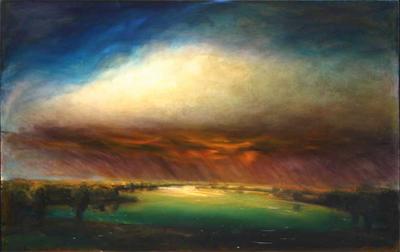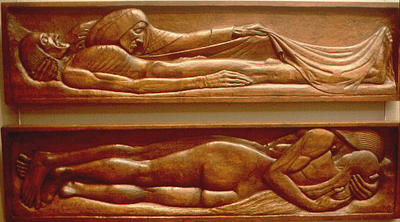Polyhymneals

Praise the dark heavens for the sweet balm of heavy rains falling for two nights in a row, seabreeze fronts stalling over our dry city and pouring, pouring, pouring their blue lactate over garden and house and oaks with the heavy torrent of long-pent, mightily-spent loins. When it rains that way the 3 a.m. which follows is especially rich and rowdy, frogs barking from the marges, a luxuriant hush addling the garden, the surfeit of fullness now in feral receipt, emboldening every blade and petal to lift and hurl with every iota of those skies now marrowing their green bones.
***
Mornings as these are heavy with sweetness, the mind dipped in lush darkness and rising, full-mooned, with the insides of oceans and woumbs, wholly voweled, a crescendo of every morning spent penetrating a Theme ... Fucking it from every position, lavishing my tongue over every swell and crevice, mixing my spume in Her oils, ferrying that dark appasionata here.
WATER SERPENTS
David St. John
Beneath the lit silk of your naked body
When you move your bones move like nervous water snakes
A complicated Medusan nest of rippling eels
Currents in the dawn river
My own body littered by broken limbs of almond sunlight
As your breath uncoils its music & anxious histories of sexual pride
Echo from the hotel room next door
As our own pasts rise through the water like sacred filaments
& in our dead lovers' eyes we can recall
Woman upon woman upon man swirling in a pool of memorylessness
& upon the shore the day arrives entwined in its sisterly mass of red hair
Those brash & roiling fields of ruby kelp where
The dark sailor's body is found

Neumann, in "The Moon and Matriarchal Consciousness," says that the creative mind -- which he associates with the older, "matriarchal" style of consciousness -- knows and grows through a process of conception and birth:
"For matriarchal consciousness, understanding is not an act of the intellect, functioning as an organ for swift registration, development and organization; rather, it has the meaning of a 'conception.' Whatever is to be understood must first enter matriarchacl conscousess in the full, sexual, symbolic meaning of a fructification.
But this feminine symbolism does not stop here, for that which has entered must come forth. The phrase 'to come forth' marvelousely expresses the double aspect of matriarchal consciousness, whcih experiences the light of consciousness like seed that has sprouted. But when something enters and then comes forth again, this something involves the whole psyche, which is now permeated through and through with the full grown perception that it must realize, must make real, with its full self. This means that the conceiving and understanding have brought about a personality change. The new content has seized and stirred the whole being, whereas in patriarchal consciousness it would be too often only have been filled in one intellectual pigeon-hole or another."
***
My dream last night perhaps was cauled in the post-drench hallows of the night's rapt garden, a sort of high-summer mass or massing or deliverance of some version of saturated arising which Neumann mentions above:
I'm "back in school," though the year is indeterminate. I'm younger yet also older or fuller somehow, the first day of classes striated with several spectra of psyche: the fear and anticipation I felt as a kid; my history of dreams of going back to school, which always seemed fraught with frustration and addlement (having to go back, not knowing clearly why I was there or what I was to do; often I'd realize there was a class I had "forgotten" to attend for months, and had to prepare for a final exam); and finally something else, as if going back to school was something essential and core-driven, part of my nature, always a next step steeped in old and oldest things--my most natural, albeit fraught, activity ...
Anyway, I couldn't find the class -- there was a row of rooms down a hall and I couldn't find classroom No. 2, the number printed on my class schedule. The rooms were 1, 9, 3, 4, etc. I walk back and forth as the hours and days and years progress, an eternal vigil not knowing where I was to enter. Stuck at the threshold.
Finally I ask someone -- a pair of older women, I think, though they may have been lovers from my past, or simply old classmates or cowokers. One of them smiles (shadowy, like a woman of the well holding a finger to her lips), walks up to room #9, and tilts the number the other way: 2. Oh.
Inside I sit down at a cramped desk (they always seem so small, as if I'd outgrown them by many years) smelling cigarette smoke, Seems that my Teacher doesn't play by Their rules. She's an art instructor of sorts, rebellious though in her mid-40s, not so much a person as an attitude. I'm working on a cigarette myself, smoking the last of a butt, trying to get in my fistful of nicotene before class starts. (I quit a heavy smoking habit twenty years ago.)
The Teacher is going on with the class and I realize that I'm in media res, mid-course, having missed the first half. Can I catch up? She tells me that I need to know Adobe InDesign for coursework, a desktop layout program I don't know. She seems to think that a forbidding requirement but I smile, because I know I have more than 10 years of graphic design experience doing layout work in Quark.
And when she hands out the next writing assignment, I smile again: one of the topics is to write about St. Oran of Iona, an otherworldly figure I have studied and written at great length about over the years, so much so that I wonder if I should purposely write about something else this time.
Yet the Teacher and I strike up a conversation about St. Oran. We both have read Fiona MacLeod's wonderful accounts of him in Iona, and that story makes me think of aquatic qualities which the Teacher may not have read, like "The Children In the Sea." I tell her about my blog (the one you're reading). Here the dream seems to confect the communication as occuring over the phone; I read off the URL and she repeats it, typing it into a computer on the other end of the line. She sees my online name -- Brendan MacOdrum -- and sighs. I then tell her about my father's first experience with the mysteries of Iona and how that led him to raise huge stones on his property in the shadow of Blue Mountain in eastern Pennsylvania, and without going on she understands that I have written about Oran at such length for the reason that I stand in the shadows of those stones he raised, or something like that. That's where the dream sort of dissembles into this waking.

THE MAKING
St. Oran's Day, 1995
Here in the days of seed
words turn back to soil
in a darkening gold forest.
On these late afternoons
the sky is so hard and blue
you can almost reach out
and cup the far indigoes.
The last leaves of the oaks
are whispers of that
approaching dark as they
unhook and fall,
each spiral so slow
and inexpressibly sure.
My father's stones
fling their long shadows
toward the pooling dusk.
They are sturdy enough
to survive the growing
winter stillness of his face.
So walk with him gratefully today,
son of all his making:
For that white season
that soon enough arrives
is like a page turned to cold moon,
more empty and frozen
and still than any night.
All trails grown over,
the stones muted back
to fertile mystery,
his smile among them
never to be seen again,
his making will become
all yours at last.
And then
what will you say
of those cold stones
that gleamed and danced
for him tonight
beneath the brilliant
harvest moon?
***
Indeed. In the dream my dialogue with Teacher is shadowy yet lucent, defined by historic channels yet indeterminate. Who is addressing whom? Does She instruct me, or do I have things to tell Her? Is that the way a fullness emerges -- wombed in the world, made real with words? And where does the dream place me today, trying to assess where to head next?
***
BLACK ANGUS, ST. COLUMBA
AND THE SEA-WITCH
On a cold and windy night on the island of Iona, Fiona Macleod (pen name of the 19th century writer William Sharp) hears this tale of Black Angus from the islander Ivor Macrae:
***
On a day of the days, Colum was walking alone by the sea-shore. The monks were at the hoe or the spade, and some milking the kye, and some at the fishing. They say it was on the first day of the Faoilleach Geamhraidh, the day that is called Am Fhoill Brighde, and that they call Candlemas over yonder.
The holy man had wandered on to where the rocks are, opposite to Soa. He was praying and praying; and it is said that whenever he prayed aloud, the barren egg in the nest would quicken, and the blighted bud unfold, and the butterfly break its shroud.
Of a sudden he came upon a great black seal, lying silent on the rocks, with wicked eyes.
"My blessing upon you, O Ron," he said, with the good kind courteousness that was his. "Droch spadadh ort," answered the seal, "A bad end to you, Colum of the Gown."
"Sure now," said Colum angrily, "I am knowing by that curse that you are no friend of Christ, but of the evil pagan faith out of the north. For here I am known ever as Colum the White, or as Colum the Saint; and it is only the Picts and the wanton Normen who deride me because of the holy white robe I wear."
"Well, well," replied the seal, speaking the good Gaelic as though it were the tongue of the deep sea, as God knows it may be for all you, I, or the blind wind can say; "well, well, let that thing be: it's a wave-way here or a wave-way there. But now, if it is a druid you are, whether of fire or of Christ, be telling me where my woman is, and where my little daughter."
At this, Colum looked at him for a long while. Then he knew.
"It is a man you were once, O Ron?"
"Maybe ay and maybe no."
"And with that thick Gaelic that you have, it will be out of the north isles you come?"
"That is a true thing."
"Now I am for knowing at last who and what you are. You are one of the race of Odrum the Pagan?"
"Well, I am not denying it, Colum. And what is more, I am Angus MacOdrum, Aonghas mac Torcall mhic Odrum, and the name I am known by is Black Angus."
"A fitting name too," said Colum the Holy, "because of the black sin in your heart, and the black end God has in store for you."
At that Black Angus laughed.
"Why is the laughter upon you, Man-Seal?"
"Well, it is because of the good company I'll be having. But, now, give me the word: Are you for having seen or heard of a woman called Kirsteen M'Vurich?"
"Kirsteen-Kirsteen-that is the good name of a nun it is, and no sea-wanton!"
"O, a name here or a name there s soft sand. And so you cannot be for telling me where my woman is?"
"No."
"Then a stake for your belly, and nails through your hands, thirst on your tongue, and the corbies at your eyne!"
And, with that, Black Angus leaped into the green water, and the hoarse wild laugh of him sprang into the air and fell dead upon the shore like a wind-spent mew.
Colum went slowly back to the brethren, brooding deep. "God is good," he said in a low voice, again and again; and each time that he spoke there came a daisy into the grass, or a bird rose, with song to it for the first time, wonderful and sweet to hear.
As he drew near to the House of God he met Murtagh, an old monk of the ancient race of the isles.
"Who is Kirsteen M'Vurich, Murtagh?" he asked.
"She was a good servant of Christ, she was, in the south isles, O Colum, till Black Angus won her to the sea."
And when was that?"
"Nigh upon a thousand years ago."
"But can mortal sin live as long as that?"
"Ay, it endureth. Long, long ago, before Oisin sang, before Fionn, before Cuchullin, was a glorious great prince, and in the days when the Tuatha-de-Danann were sole lords in all green Banba, Black Angus made the woman Kirsteen M'Vurich leave the place of prayer and go down to the sea-shore, and there he leaped upon her and made her his prey, and she followed him into the sea."
"And is death above her now?"
"No. She is the woman that weaves the sea-spells at the wild place out yonder that is known as Earraid: she that is called the seawitch."
"Then why was Black Angus for the seeking her here and the seeking her there?"
"It is the Doom. It is Adam's first wife she is, that sea-witch over there, where the foam is ever in the sharp fangs of the rocks."
"And who will he be?"
His body is the body of Angus, the son of Torcall of the race of Odrum, for all that a seal be is to the seeming; but the soul of him is Judas."
"Black Judas, Murtagh?"
"Ay, Black Judas, Colum."
But with that, Ivor Macrae rose abruptly from before the fire, saying that he would speak no more that night. And truly enough there was a wild, lone, desolate cry in the wind, and a slapping of the waves one upon the other with an eerie laughing sound, and the screaming of a seamew that was like a human thing.
So I touched the shawl of his mother, who looked up with startled eyes and said, "God be with us"; and then I opened the door, and the salt smell of the wrack was in my nostrils, and the great drowning blackness of the night.
- Fiona MacLeod, Iona

"Just as Persephone let herself be carried off by the king of the dead, so Dionysos ties a fig branch to a gravestone and lets it penetrate him, and Demeter gives herself to the mortal Celeus. The memory of this divine prostitution was buried deep in the mysteries.
"... [There is] a complicity between Dionysos and Demeter vis a vis their love affairs on the road to Hades.
***
"[According to Plato} Polyhymnia is one of the muses, patron of intimate lyric song. But in the Symposium Plato tells us that Polyhymnia is a fearful muse, not devoted to "fine love" at all, "which is of the heavens and the realm of the Muse Urania," but to eros pandemos, the love that grants itself to all and sundry. Divine prositituion and lyric song are linked together in the shadows."
-- Roberto Calasso, The Marriage of Cadmus and Harmony
***
That maddening muse of fleeting lovers with their insatiable mouths, naming the god in every mortal they meet: does she not proclaim, as Blake, that "everything that lives is holy"? And though that fire destroy them, does it not also rim this waking summer day, filling all that is to follow with a marrow of eternal delight?
***
MUSE OF FLEETING BEDS
I am the whore Polyhymnia, the song
scattered wide through endless couplings,
the thresh of the ten thousand tongues
which nightly name and damn one
God in ten thousand maddened ways,
the rapture of enraging, surf-crashed loins.
My song resounds in every nether world
sex torches all the way down into,
the glassy pour of every stricken pair's
slide out the back door of the honkytonk
on Friday night, out into the
bushes just beyond the dumpster
at the wildest border of the dark.
I am the sound of nether lips
sliding up and down the
hottest stone of all, a lyrich
which beseeches fire
to quench all fire in the
blackest folds of night. My song
burns all lovers' throats
and blows the top off their
collective skulls, drenching
every trysting-place with the
greasy juice of ecstasy,
a foetal foetid greasy musk
deeper than sea in pheromes,
anemones which haunt the mind
like blue-breasted sirens
singing to all the saps of Doom.
A cheap and easy barrow-dance
to every song in the juke,
that's me, old hits forever stained
with sweat and oil and spume,
the music of a frenzied wood
which parties down but good,
spilling every drop the night
has poured into the sky
'til all is blue, and fair, and waking
except the lovers now fast asleep.
I am at last the lullabye which
closes their eyes at last,
the sound of passion emptied
from every furrow of the heart.
My song at last finished with them,
I depart in the stillness of immortal
engines which I fire come the
next night when love again
is worlds apart. Muse of ten
thousand such beginnings,
I complete the gape from ache
to that bewildered, windblown shore
where all lovers must depart together
or wander on more alone than ever.
My name's in every crashing wave
repeating down the strand,
each one complete and vanquished
as revising fully in the next:
the infernal quatrain of big water
washing every other bed away.
***
Why is sex a transaction with death? Our minds can't comprehend the similitude, not in any literal, linear way. How could that brilliance of fructive light share a bed with the cold mordents of death? How could Persephone, spring maiden, also be Queen of Hell?

Hades had to rape Persephone to bring her to His realm. She was a sexual sacrifice, the sanctification which allowed her to pass over was sexual. Other Gods have given themselves sexually to gain entry to the inviisible world below. Robert Calasso again in The Marriage of Cadmus and Harmony:
"Having gone down to the underworld to ransom his mother, Dionysos found himself face to face with Hades, as though looking in a mirror. the eyes staring at him were his own. Hades told him he would let Semele go, but only on condition that Dionysos gave up something very dear to him. Dionysos thought. Then he offered a twig of myrtle to the lord of the invisible. Hades accepted.
"How is it that that humble plant could settle such a portentious deal? Myrtle was the plant young spouses were crowned with on earth. And Hades couldn't get enough of spouses and their nuptials. He wanted the kingdom of the dead to be mingled with the realm of eros. Not so as to conquer it or subdue it. In fact, Hades agreed to let Zeus's lover, the mortal Semele, ascend to the heavens, 'having been granted permission by the Parcae.'
"No, what he really wanted was to mix the two kingdoms together. The myrtle was Aphrodite's plant before it was Dionysos's, and until his visit to the underworld it had been just the casual, fleeting fragrance of lovemaking. But from now on it would spread the fragrance of another world as well, the unknown. Thus the myrtle became the plant of both eros and mourning."
***
The homonymneonic link between womb and tomb keeps our ear's sense close, a resonant, tide-washed cavern which fills and empties again and again with some new receipt of vigorish, all I hurled in the sea seeking Her recognition, just as I empty every engine at my disposal trying to bring Her back from the dead. The lover clenches and sighs, "I dye," expiring every dram of virility into his love, and the song of Polyhymnia completes itself, leaving the fragrance of the myrtle, musk of every hot-soiled bed, reeking of the riot and rot of the world.
***
THE RED LEAVES OF NIGHT
David St. John
In my dream we are walking together
Through a forest of blanched birch & ragged beech perhaps
I know only that the trunks reflect their mottled
& luminous white bodies in the moonlight
& as we walk to some destination we seem not to know
I notice that the forest floor is matted again
With a blanked of fallen red leaves each as narrow as a finger
Thin pages torn from a pilgrim's book & some
Seem to have scrawled upon them sentences that themselves
Are written in the sticky red of blood entries
In the journal I heard you promise God you will burn tomorrow
& as we walk I can feel beneath my bare feet how soft
& cushioned by such fallenness this passage has become
This journey through the forest of the night
Along a path of red sorrows leading us together to some newly solitary
& distant home


<< Home